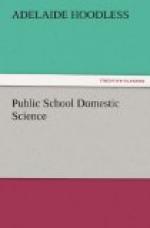Another point to consider in the planning of meals is economy of fuel. The thoughtful housekeeper will arrange to have food requiring long, slow cooking, such as stews, soup stock, bread, etc., and ironing done by the same fuel. Broiling, toasting, omelets, etc., require a quick fire. It is in the careful consideration of details that economy in both food and fuel may be exercised.
FOOTNOTE:
[5] The teacher may make this clear by comparing the digestion of the two classes to the action of the air upon coal in a range with the drafts open and closed, the more rapid combustion, effect of oxygen, etc.
* * * * *
SUGGESTIVE QUESTIONS.
In giving instruction in Domestic Science, the teacher must be careful to explain the meaning of any words used which the pupils would not be likely to understand; for instance, oxidation, combustion, solubility, etc., and many of the terms used in the analysis, such as fermentation, casein of milk, albumen, cellulose, etc. In order to keep the attention of pupils fixed on a subject, frequent illustrations and comparisons should be made.
Questioning is one of the best methods of riveting attention, and as every teacher has not the faculty of asking questions, a few suggestive ones are given which may prove helpful.
Why do we eat food?
What is nitrogenous food?
What is its chief office?
Where is it to be found?
In what section of vegetable kingdom is this compound abundant?
What is the chief nitrogenous compound in meat and eggs?
Of what is it composed?
Why do we call these compounds nitrogenous?
Do they serve any other purpose besides building up flesh?
Which are the most important heat-giving compounds?
What is the proportion in food they should bear to the flesh-forming compounds?
What other compounds are necessary to form a perfect food?
Give their use?
Where are they to be found?
What is common salt?
Where is it found?
Why do we use it?
Give the three digestive juices.
What kind of mineral matter do we find in vegetables?
Why should potato parings, leaves and stalks of cabbage not be put in the dust bin or garbage pail?
What should be done with them?
Which are the most important warmth-giving foods?
Give another name for these foods?
Why are they so called?
What is combustion?
How do these foods produce force, etc.?
What other elements do these foods contain?
Why are fats and oils more valuable as heat-givers than starch or sugar?
What elements unite and form water?
What is the proportion of water in the body?




